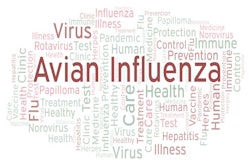
Over the past month, new cases of highly pathogenic avian influenza (HPAI) in poultry have been reported in Benin, Ghana, Niger, Nigeria and Togo. In South Africa, one further outbreak has been confirmed in a backyard poultry flock.
In just three districts in central Nigeria, more than 100,000 poultry have been hit by HPAI, reports Guardian of Nigeria. A further 108,000 birds are at risk of contracting the disease in the state of Kaduna. Three farms have already been depopulated, and a fourth is awaiting the procedure.
The presence of HPAI virus has been confirmed by the National Research Veterinary Institute.
Over the past month, the West African state’s animal health agency has officially registered 37 HPAI outbreaks in poultry. According to the latest reports to the World Organisation for Animal Health (OIE), all outbreaks involved the H5N1 HPAI virus serotype, and started between November 16, 2021, and January 11.
Over this period, the virus was detected at 26 farms, in 10 backyard flocks, and one live bird market in 11 different states.
For those outbreaks in which the type of birds was specified, the great majority were in laying hens. Largest flock to be affected had 11,000 birds. Each of the non-commercial premises had up to 500 birds, and 2,800 laying hens were directly impacted by the outbreak at the market at Bauchi.
In Nigeria, the current HPAI outbreak wave commenced in December of 2020. Based on reports submitted to the OIE, the number of confirmed outbreaks currently stands at 136. More than 1.31 million poultry have been directly involved through mortality or culling to stop the further spread of infection.
Of Nigeria’s 36 states and the Federal Capital Territory, 19 have been impacted by HPAI over the past 13 months.
Further outbreaks reported in Ghana
Earlier this week, Pulse reported that 8,400 poultry infected with HPAI have been destroyed in the western region of Bono. More than 2,000 birds had already died at two locations in one district. According to this source, the latest cases mark the 4th outbreak of HPAI in this west Africa state since 2015.
Meanwhile, two farms in different districts in the country’s western region have been infected with HPAI, according to Ghana Web. Both premises have been depopulated, and disinfection is underway. This region is located in the south-west of the country, bordering Cote d’Ivoire (Ivory Coast).
According to its latest review of the HPAI situation in Africa, the United Nations’ Food and Agriculture Organization (FAO) notes six additional outbreaks in Ghana. With the most recent cases in early December, these latest outbreaks of H5N1 HPAI bring the country’s total to 53 since October.
Last July of 2021, Ghana’s veterinary authority notified the OIE that seven village flocks had tested positive for this virus serotype. Affected was a total of around 9,600 poultry in the Greater Accra and Central regions. Subsequently, local media reported further outbreaks on at least 10 farms, mainly in the Greater Accra region.
HPAI returns to three more west African states
By the veterinary authority of Republic of Niger, the OIE has been notified of one new HPAI outbreak linked to the H5N1 virus variant.
Affected was a farm with around 18,600 laying hens near the capital city, Niamey. Around 1,400 of the birds were reported to have died.
The same virus serotype was last detected at one commercial farm in the same area in the west of Niger in March of 2021. By July, the outbreak was reported to be “resolved.”
To the west of Nigeria and the south-west of Niger is the Republic of Benin. Here, the presence of the same virus serotype was confirmed at a farm with around 5,700 birds in early October of last year. According to the report recently submitted to the OIE, the affected premises was located in Ouémé. Located in the southeastern part of the country, this department borders Nigeria.
According to previous OIE notifications, the same virus was detected at a farm in the same department at the end of July 2021. As of the end of November last year, this single outbreak was reported “ended.”
To the west of Benin lies the Togolese Republic (Togo). The latest report from the Togolese veterinary authority to the OIE outlines a further HPAI outbreak linked to the H5N1 virus. In the first days of 2022, the virus was detected at a farm with 11,450 laying hens and pullets. Around 1,800 of the birds died, and the rest have been destroyed. The affected premises was in the Zio district of the Maritime region, which is in the south of Togo.
Since June of 2021, five HPAI outbreaks had previously been confirmed with the OIE. All were in the same region of Togo, and each of these involved 1,000-3,000 poultry, infected by the same virus subtype. All these earlier outbreaks have recently been reported as “ended.”
Avian flu hits wild birds, backyard flock in South Africa
Over the past month, just one new HPAI outbreak in South African poultry has been reported to the OIE.
Affected by the H5N1 virus earlier this month was a backyard flock comprising 95 birds in Tshwane city in Gauteng.
In the provinces of Gauteng and Western Cape, a small number of wild birds and captive birds in a non-commercial flock have tested positive for the same virus subtype, according to further recent reports to the OIE
View our continuing coverage of the global avian influenza situation.
















